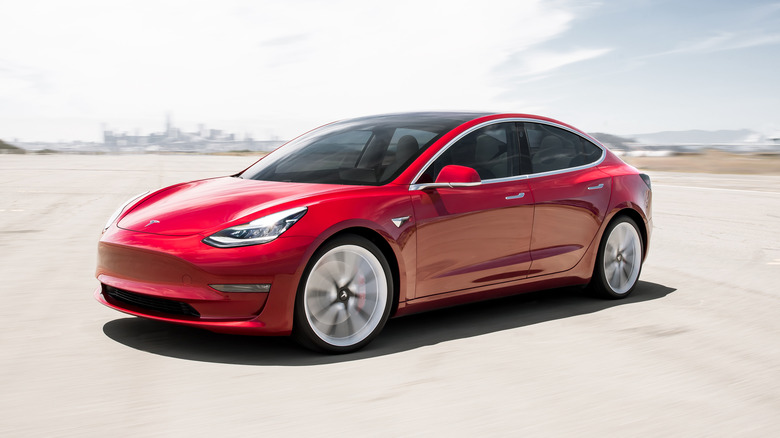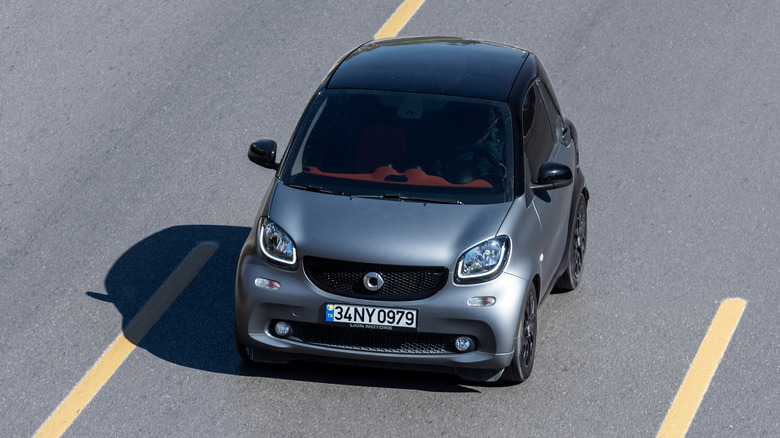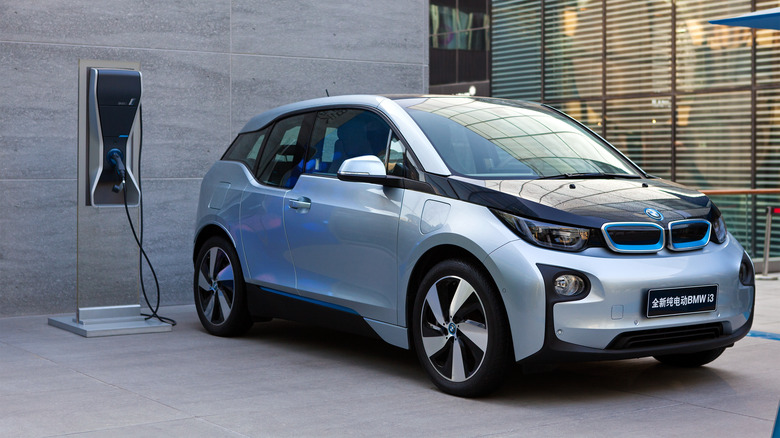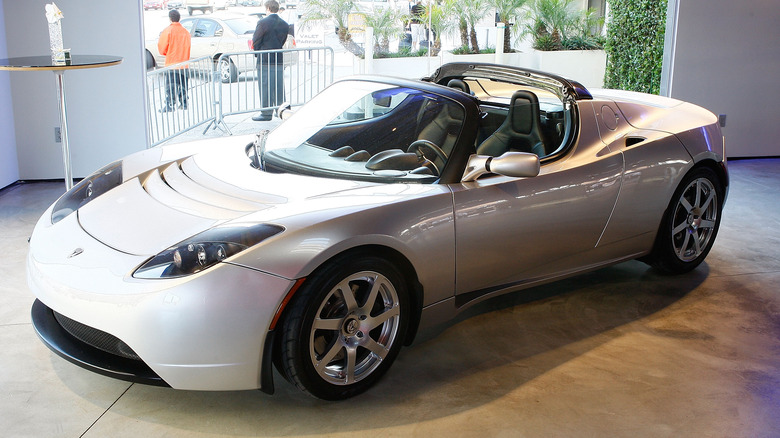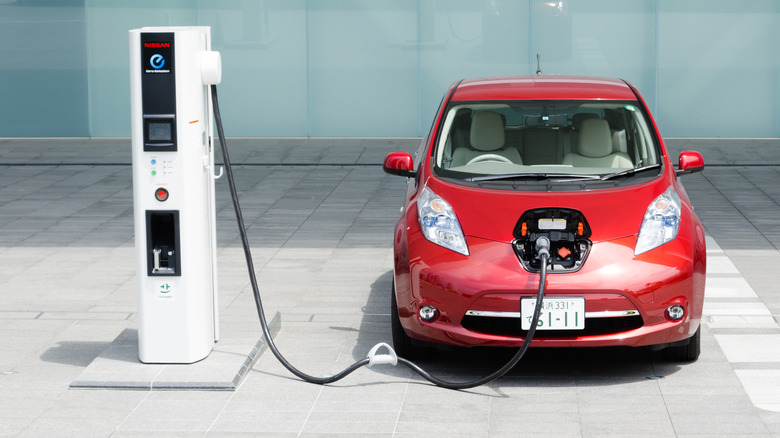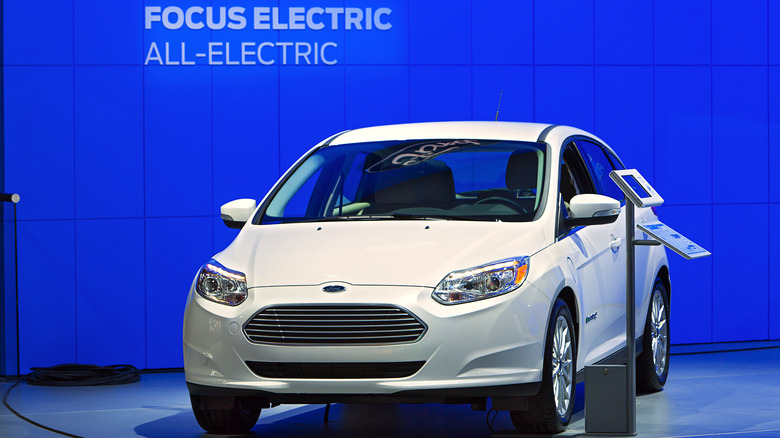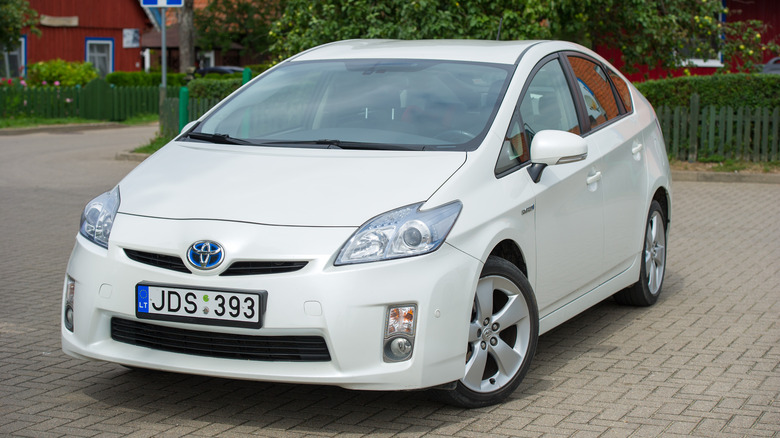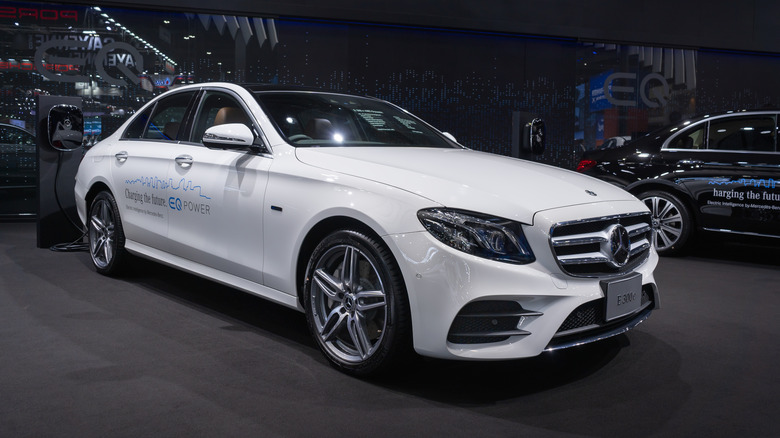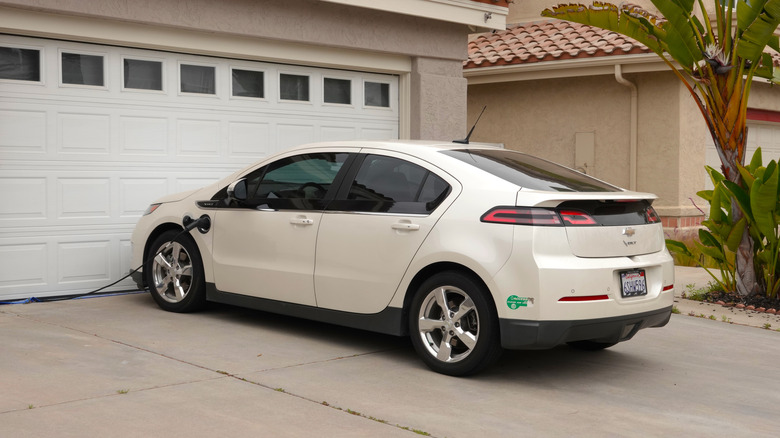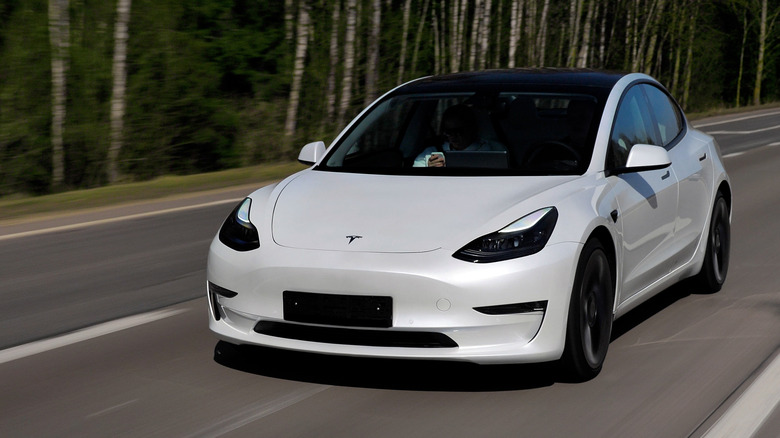Car Battery Replacements That Cost More Than You Think
Over the past couple of decades, electric vehicles have gone from being a niche subsection of the car industry to being seen as the future of the automobile. Ownership of electric cars is booming across the world, as more customers take advantage of increasing ranges, groundbreaking performance, and an ever-expanding range of vehicles to choose from. However, EVs are not without their limitations, and there are still plenty of hidden costs to be aware of if you plan on keeping your car for a long time.
The biggest, and most unavoidable, of those costs, is a battery replacement for the car. Current battery technology dictates that after a certain number of charge cycles, the capacity of the battery will degrade, reducing the range of the car. Over time, that range might shorten so much that a replacement is the only practical option, or the battery might develop a fault that causes it to stop working altogether. As the owners of many older electric and hybrid cars are finding out the hard way, replacing a car's battery can cost a lot more than expected.
VW E-Golf
The first-generation VW E-Golf was summed up by one reviewer as "like a VW Golf – but quieter." In other words, it took all the bits that made the regular Golf great and simply added an electric powertrain, without really changing anything else. That was no bad thing, as the Golf has remained one of the best hatchbacks of its size for decades, so there was little need for change. Perhaps the most noticeable difference between the E-Golf and the gas-powered version was its reduced range — the earliest models could only manage a measly 124 miles of range when new, while the facelifted 2017 model managed a still-disappointing 186 miles.
That's still significantly less than even the most gas-guzzling ICE cars could manage in one trip, and by now, those early models will have lost even more range thanks to degradation. Anyone who buys one on the cheap thinking they can get a battery pack replacement might be in for a shock, as reports suggest that a full replacement will cost at least $23,000. It's worth noting that this isn't the only option owners have — in some cases, reconditioning the battery or paying to have just the faulty cells replaced will be significantly cheaper. Even so, the risk of having to fork out for the full replacement may well be enough to put off more budget-conscious buyers.
Smart Fortwo
Smart's signature supermini seems like a natural candidate for electric conversion, as most of its owners are city dwellers who won't need a huge amount of range for their daily commutes. The electric Fortwo first launched in select markets in 2007, before launching in the U.S. and Canada at the end of 2010 (via New Atlas). At launch, the car only had an official range of 83 miles, and its top speed was limited to 62 mph, making it all but useless anywhere apart from a congested city. Still, the car found plenty of fans both in the U.S. and across the rest of the world, with Daimler producing over 1,500 examples each year.
The car was always designed to be an affordable runabout, so the idea of shelling out large sums of money to keep one running seems like a non-starter. Unfortunately, owners in need of a battery replacement won't have much choice, because the average cost of replacement reportedly sits somewhere around the $18-20,000 mark. For comparison, when the electric Smart was axed in 2019, its starting price was $24,650.
BMW i3
BMW's first production electric car was also one of the weirdest-looking cars made by the brand. Originally unveiled in 2013, the first-generation i3's 22-kWh battery could manage only 81 miles of range. In 2017, the car was relaunched with a 33-kWh battery that promised 114 miles on a single charge. A range-extender variant was also launched the same year with a small gas engine. By 2021, the i3 has been given the chop to allow BMW to focus on launching its new range of EVs, but there are still plenty of examples floating about on the used market.
As with any used EV, one of the biggest things to watch out for on a second-hand i3 is the health of the battery, as replacing it is going to be expensive. A 2016 report suggested that replacing the car's original 22-kWh battery pack would cost around $16,000, with the larger pack potentially costing even more.
Tesla Roadster
The first production Tesla still remains the brand's only proper sports car, despite Elon Musk's repeated assurances that a new-generation Roadster is just around the corner. The first-gen car sold out of its 2,500-unit production run in 2012, although at an MSRP of $109,000, it was only affordable to a lucky few, to begin with. Thanks to its rarity, along with its legacy as a piece of EV history, used values of the Roadster have held up exceptionally well. They don't often come up for sale, but when they do, expect to pay close to the original asking price, and perhaps more for a rare "Signature 100" model.
While the low production volume of the car makes up-to-date replacement data practically impossible to find, Tesla's 2015 battery upgrade for the Roadster does reveal a rough estimate of how much a battery replacement might cost. The upgrade, which promised around 40% more range over the original battery pack, retailed for $29,000. Although that's as much as some new cars, with the Roadster's excellent resale values, it seems like a fair price to pay.
Nissan Leaf
One of the first EVs to hit the American market was the Nissan Leaf, and it has remained one of the most popular throughout its decade-plus on sale. The current Leaf is also a bit of a bargain, with federal tax credits pushing the car's retail price down to around $20,000. It's good value when it's new, then, and it turns out it's also relatively affordable to replace the battery pack of a used example, at least in comparison to many other EVs.
According to Recurrent, the cost for replacement will be anywhere between $5,500 and $9,500, depending on the capacity of the battery pack. It should be noted that this cost doesn't necessarily include any markups that a dealership might charge on parts, and labor costs can vary wildly. Even so, the Leaf seems to be by far the most affordable BEV for a full battery pack replacement.
Ford Focus Electric
A rival to the E-Golf, the Focus was built on much the same ethos as its German competition. Take a well-loved family hatchback and simply add an electric drivetrain. The trouble is, the gas-powered Focus gained fans because it was reliable, comfortable, and cheap to maintain, while the electric version seemingly forgot about the last part. Some buyers who bought a Focus Electric assuming it would be just as affordable to run as its gas-powered sibling got a nasty surprise when the car's batteries failed unexpectedly.
One family, speaking to a local news outlet, told reporters that they'd paid $11,000 for the car as a means for their 17-year-old daughter to get to school. The car was eight years old at the time they bought it and had just 60,000 miles on the odometer, but less than six months later, it had stopped working altogether thanks to a battery fault. The Ford dealership advised the family that the battery pack would cost $14,000 to replace, more than they paid for the car. The dealership eventually offered the family just $500 to take it off their hands, which they declined. While this is one isolated case, it begs the question of how much risk the average buyer is willing to take when it comes to buying a used EV. Evidently, buying the wrong one could leave them with a huge bill that they won't want, or simply can't afford, to pay.
Toyota Prius
It might not be a full EV, but the enduring popularity of the hybrid Toyota Prius has meant that there has been a steady stream of owners eventually needing to get their car's battery packs replaced. The Prius' hybrid battery is generally reported to be long-lasting, with a replacement needed every eight to 10 years or 120,000 to 160,000 miles, according to Exclusively Hybrid. In some cases, the battery should still just about be covered under the factory warranty, but even if it isn't, there's no need to be too worried.
Replacing the battery pack will cost up to $4,000, although depending on the year, that figure can drop down to around $2,000. Since there's also a large used market for spare Prius batteries, it's possible to get a used or reconditioned pack for even less. Fixing only the damaged cells rather than replacing the entire pack could also save a significant amount of money.
Mercedes-Benz E300 Hybrid
While replacement hybrid batteries for a Prius might be reasonably priced, not every hybrid owner will be so lucky. Mercedes-Benz hybrids seem to have particularly extortionate battery replacement costs, at least if the experience of one UK owner is anything to go by. A local news outlet reported that the owner took an E300 hybrid to a Mercedes-Benz dealership after its battery failed, and was quoted around £15,000 (roughly $18,500) for a replacement. Believing he was being ripped off, he took the car to an independent specialist, who confirmed that no cheaper alternative was available.
At the time of the failure, the car was only eight years old, but its book value was less than the proposed repair price. A spokesperson for the automaker responded to the claims made in the article by stating that the car's hybrid batteries were only covered under warranty for the first three years it was on the road and that the owner should have been made aware of this before purchasing the car. Hardly much comfort to the exasperated buyer who had to choose between forking out for a five-figure repair bill or scrapping the car altogether.
Chevrolet Volt
If shelling out nearly $20,000 on repairing an eight year old Mercedes-Benz sounds like a bad deal, then it might be surprising to find out that repairing a used Chevy Volt might be just as expensive. Estimates for replacing the hybrid car's battery seem to vary wildly, with even Chevrolet themselves unable to give a clear answer. Autoblog reached out to a Los Angeles-based Chevy dealership in an effort to clear things up, and was quoted anywhere between $3,400 and $34,000 for a "drive motor replacement battery." The dealership said that, to be any more specific, they'd have to take the Volt in for inspection themselves, so the outlet contacted a GM representative to ask for further clarification.
The representative responded by saying that the strategy for fixing the Volt's battery pack was to repair rather than replace, but that "the high end of [the range] provided is not consistent with what we would expect the customer to pay." He went on to suggest that the $34,000 estimate could include a dealer markup. So, in other words, no one seems to be sure what an actual replacement costs, but if it's even half of that $34,000 top-end figure, it could spell disaster for budget-conscious owners.
Tesla Model 3
The Model 3 is Tesla's most affordable model, with prices currently starting at just under $44,000 without tax incentives. Tesla's battery packs have gained a reputation for being among the most long-lasting on the market, with very little degradation even after racking up the miles. InsideEVs reported that an average Tesla battery should still retain 90% of its range even after 200,000 miles, making it outlast the vehicle in most cases. However, there's still the issue of unexpected out-of-warranty failure to consider, and in the rare case that you need to replace the battery of a Model 3, it's not going to be cheap.
Recurrent estimates the price of battery replacement to be roughly $15,800, or in the case that a battery needs repair due to damage in an accident, around $10,000-$12,000. It's worth noting that this is only a rough estimate, as there simply isn't enough data around to make an accurate overall average. Even so, it's still a significant portion of the initial value of the car, and it's more than many Americans would be comfortable paying out for repairs. This has been shown to put plenty of potential buyers off purchasing a Tesla altogether, with SlashGear's 2022 survey suggesting that 65% of respondents wouldn't buy one simply because of the risk of costly battery failures, even if that risk is a small one.
